František Lukšík
Born in 1900, České Budějovice - executed in Prague on December 6th, 1930
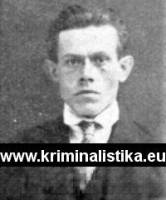
František Lukšík was sentenced to death and executed just because the then-press wanted to. Lukšík was described as a cold-hearted murderer who deserved the only sort of punishment - the death sentence. The press even blamed on justice of being too indulgent of criminals. The journalists mentioned the Then-President T. G. Masaryk, as well. They criticised Masaryk changing the death sentences into life imprisonments.
František Lukšík works as a day-labourer in lumbering company, Prague - Bráník. Ludmila Grujbárová (23), coming from Malacky, Slovakia, works there as an accountant. On Saturday, November 9th, 1929, after the working hours, Lukšík, holding a hammer in his hands, attacks Grujbárová in her office. As she still soughs, he gags her mouth and binds her neck with a rope. Not to be blood-spattered, Lukšík throws his shirt over the lady's head and hits it with the hammer five more times. He drags the dead body to the near shelter and tries to wash the blood from the floor. He steals more than 5,000 CZK from the safe.
Křižan Company - the murderer and his victim worked there
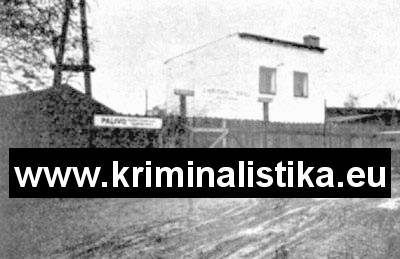
Lukšík leaves the scene of crime by tram. He visits his married girlfriend, arranges a meeting with her and leaves to buy a new suit, a hat and some other small stores. He meets a streetwalker outside the Lucerna Arcade. They take a taxi and go to a hotel in the centre of Prague. Short before the midnight, he hires another taxi and sees the woman to her flat in Žižkov, Prague. The same taxi drives him near the scene of crime. Lukšík puts the dead body into a bag, drags it on the bridge over the River Moldau and throws the corpse into the river. He throws her blood-shot dress into the river too. Lukšík, his girlfriend and her mother go to the cinema the following day. Having returned from the cinema to the place of his residence, Lukšík is arrested. He pleads guilty after a ten-minute interrogation.
The office Ludmila Grujbárová was murdered in
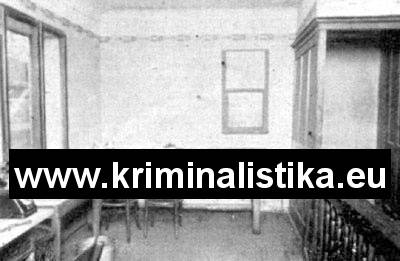
The report of the murder and Lukšík's statement become the prime headlines in every Prague newspapers. The search for the dead body starts on Monday morning. The general public is involved. The corpse is picked up from the river a few hours later. She has her underclothes and her dustcoat on. Her mouth is gagged and there is a rope bind round her neck. The autopsy confirms the Lukšík's statement. What is more, her virgin state is proved...
The cold-blooded murder of an orderly woman and several death sentences changed into life imprisonments by the Then-President T. G. Masaryk make the journalists think and come to the only conclusion - the murderer will be sentenced to death, but his punishment is certain to be changed into the life imprisonment. The press even blamed on justice of being too indulgent of criminals. And thus the Ludmila Grujbárová murder becomes the all-society matter.
Ludmila Grujbárová in the autopsy room
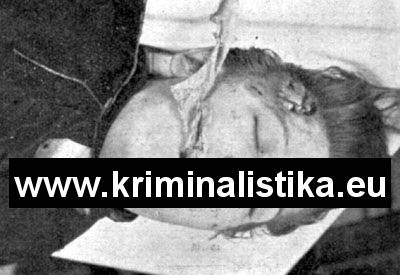
The funeral of Ludmila Grujbárová takes place in St. Stephen Church in Prague. 15,000 people crowd round the church in the neighbouring streets. But only twenty of them knew her in person. The swarm of the people follow the coffin to the railway station. Ludmila Grujbárová returns to her home town (Malacky, Slovakia) in a special waggon. Hundreds of people line the Prague - Bratislava railroad. All the investigators from the Criminal Intelligence Department and lots of police constables are concerned in the funeral. By the way, Maxmilián Paleček, an old pickpocket, is caught red-handed during the funeral...
Lukšík is brought to justice on February 19th, 1930. No extenuating circumstances are found. Lukšík even was prosecuted for the vagrancy, the robbery and some other crimes against property. When in military service, Lukšík steals. He deserts too. He has been punished nine times. The experts do not prove that Lukšík suffers from any mental disease. He committed his crime fully conscious. The trial jury find Lukšík guilty with one voice. The sentence is as follows - death sentence - hanging... The trial is ready to vote down Lukšík's possible plea for mercy addressed to the President. It means that both the sentencing council and the state attorney meet wishes of both the journalists and the general public and sentence Lukšík to death. The murderer himself waives the right of appeal...
The Then-Minister of Justice is the only person to protest against the death sentence. He files a proposal for changes to sentence writing: "The public and the gutter press are not the authorized people to substitute and influence the trial. It is proved that the death sentence does not work as a proper cautionary tale. There were committed three acts of murder after the last execution (Bognár, Bratislava) in the country within a week. Even some more sever crimes were not punished in such a strict way in the Austria-Hungary period..."
The Office of the President of the Republic prepare a plan for grant pardon for František Lukšík one week before the execution. The President does not sign the amnesty. The League of Human Rights sends the František Lukšík Death Sentence Cancel Request by wire. The prominent personalities living both in Czechoslovakia and from abroad are the addressees. Unsuccessfully.
Lukšík is not lucky enough. He commits his crime in the period of sharp rise in crimes of violence. There are committed 25 more murderers in the then Czechoslovakia from October 1st to November 15th, 1929 (within a six-week period). Ludvík Bognár (40) is executed for Povážská agrarian and industrial bank heist. That crime takes a seven-toll of live, two policemen are among the victims. The murder of police constable Florián and his wife is under the police investigations. That crime is committed by Ellinger (the vagabond) in Želetice near Znojmo. The murderer Filipín, who has murdered three people in Náměšť nad Oslavou, is just about to be brought to justice. German policemen are in search for "the Düsseldorf Monster" - Petr Kürten, who is suspected of murdering eighteen people. Lukšík's behaviour is said to be cynical on all hands. That sort of behaviour became fatal to him...
Police photograph of František Lukšík
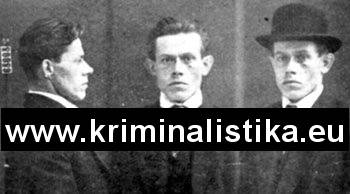
The execution takes place in the courtyard of the court in the Charles Square on December 6th, 1930. Journalists are not welcome. Lukšík spends the whole night in the company of the priest. In the evening, he receives a message that his mother, living in České Budějovice, will not arrive as she is said to be affraid of her journey to Prague...
The execution is about to start at 6:45 a. m., December 6th, 1930. The officers of the Prague Police Headquarters, the whole sentencing council, the head of prosecution, three medical examiners and prison wardens take part in. And the executioner and his helpers, of course. Lukšík leaves saying: "Please, tell Grujbárová's parents that I am sorry..." The execution is over at 7:00 a. m. sharp! The neighbouring streets are unusually empty, the journalists seem to pay no attention...
© Miloslav Jedlička, D. C. L.Translated by inspector WO Pavel Vršovský, M. A.